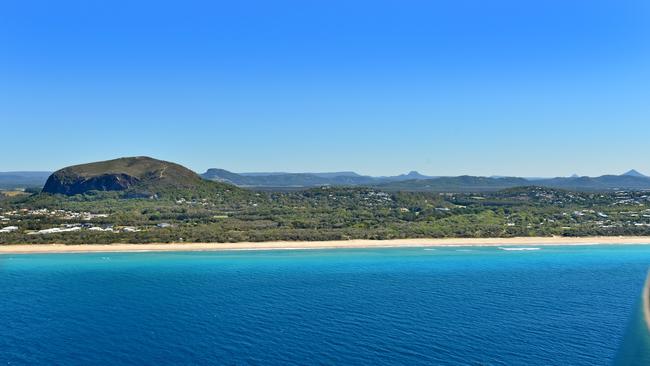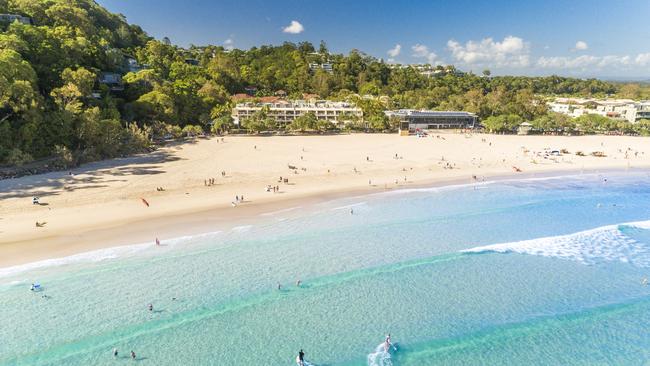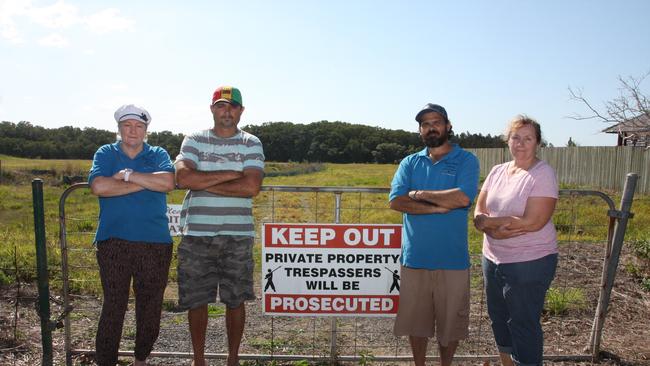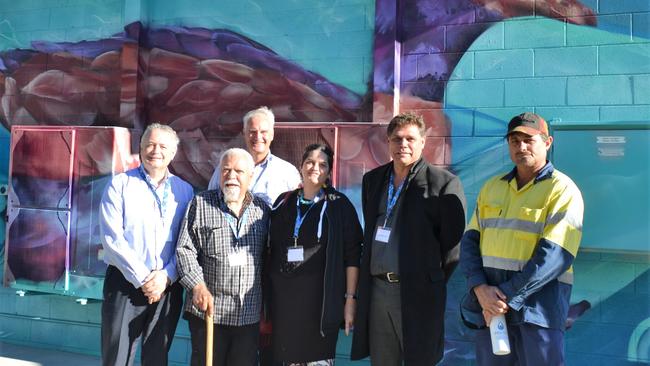Your native title questions answered after landmark Qld ruling
Will beaches, mountain climbs, and national parks be closed? Will it harder to be develop land in Queensland? Will it affect my building project? Will native title holders be able to come onto my property? We answer your questions.

QLD News
Don't miss out on the headlines from QLD News. Followed categories will be added to My News.
Will beaches, mountain climbs and national parks be closed? Will it harder to be develop land in Queensland. Will it affect my building project? Will native title holders be able to come onto my property?
The granting of native title over a massive area of the Sunshine Coast north to the Fraser Coast has sparked many questions from our readers with some feeling their existing rights, way of life and the simple pleasures they enjoy are under threat.
So what’s the real story?
In simple terms, native title recognises Aboriginal and Torres Strait Islander peoples’ rights to lands and waters that come from their traditional lores and customs, while freehold means exactly that – the land is owned absolutely and owners are free to use it as they choose, provided they follow the law and comply with planning requirements.
The landmark agreement for more than 365,000 hectares of land on the Sunshine Coast and beyond is a non-exclusive one. And there’s a big difference.
Here we try to answer some of our readers’ key questions, based on advice from the experts and past experience.
What land size does this decision include, and how many existing residents are affected?
Speaking during Monday’s Federal Court proceeding, solicitor for the applicants (Kabi Kabi people), Michael Allbrook: “The area subject to the application is 10,280 square kilometres and there are More than 300,000 residents. The area extends in the south from the Elimbah Creek catchment area, Sandstone Point and Bribie Island; to Cooloola National Park, Curra State Forest, Mary River, and the Isis River in the north; to the Brisbane and Burnett ranges in the west.”
What can the Kabi Kabi now do under the Native Title claim?
While handing down her decision during Monday’s Federal Court proceeding, Acting Chief Justice Berna Collier: “The Kabi Kabi people can have access to, be present on, camp and temporarily live on, build temporary shelters, take natural resources, participate in cultural acts, bury other Native Title holders, maintain places of importance and areas of significance, teach the physical and spiritual connections of the land, hold meetings, and light fires for cooking.”
Does this decision mean the Kabi Kabi people get land handed over to them?
Queensland South Native Title Services CEO Tim Wishart: “It is important to understand that Native Title, despite what some people say, isn’t land rights. It doesn’t give Aboriginal and Torres Strait Islander people land, it is simply a recognition of the rights and the determination lists the rights the Kabi Kabi people can exercise in a non-exclusive way. As those who were in court heard the judge say, what a non-exclusive way means is that the determination is subject to the laws of the state, so the right to coexist with those laws. If the rights are inconsistent with those laws, the laws of the State and Commonwealth overrule the Native Title rights.”
Can they come onto land or property I own in the designated area?
“Native Title does not affect anyone’s house or land or where they live. People aren’t going to come and camp in Mum and Dad’s backyard, because that is freehold land. You have your rights as a freehold land holder, you can say who comes and goes from your property and that includes Native Title holders because they did not get Native Title rights over your backyard.”
What kinds of natural resources do the Kabi Kabi people have the right to take?
“What the right to take for any purpose recognises is that Aboriginal people had a trading economy, and until fairly recently, Native Title law didn’t recognise that Aboriginal people were active traders, and certainly the State of Queensland didn’t recognise this. “This is the first South East Queensland case where the right to take for any purpose has been recognised. What that means is Kabi Kabi people can take natural resources, for example Bunya nuts or fish, and trade them. But not in a commercial sense, the rights are subject to the laws of the country and state – so if you require a permit to fish, that still applies. So it’s not about mining. The Kabi Kabi don’t get any right to dig up the ground to look for gold, coal, or gas.”
Does it mean the state government cannot build new residential developments on current vacant land?
“The important thing to understand is that Native Title does not affect freehold land. So if freehold has been granted, and if an exclusive lease has been granted, that extinguishes Native Title. The State still has land available to it to make available for freeholding. But if it’s freeholding land that has not previously been freehold, it will have to talk to the Kabi Kabi people about that.”
Will Queensland be closed for future development
Native Title holders do not have a right to veto development. If a development is proposed on land over which native title exists, native title holders may have some procedural rights to, for example, be consulted and to comment on the proposed development. In some situations, the First Nations consent to a development is captured in an Indigenous Land Use Agreement. People operating on Kabi Kabi Country are encouraged to build good working relationships with The Kabi Kabi people as the rights of the Kabi Kabi people coexist with the rights of others. The determination does not change the existing cultural heritage laws. Queensland’s cultural heritage laws operate regardless of native title.
Will land developers and the public applying for extensions or building houses have to pay to have cultural heritage clearances
The short answer to this is “no” as the existing cultural heritage laws generally do not require a clearances for the building of houses and extensions on already developed land. Native Title rights are “inalienable” which means they cannot be sold. If the rights are “surrendered” to the State Government, the State Government can then sell the land.

Will these changes grant power to Aboriginal groups to shut down public parks, beaches, four-wheel drive tracks, fishing and other public access?
The short answer is no, given this a non-exclusive determination. For example, if non-exclusive native title rights are recognised over a recreational reserve, Aboriginal people can use that reserve for certain traditional activities. The local public can continue to use the same reserve for recreational activities. When an Aboriginal group holds non-exclusive native title rights, that group cannot tell the public to “get off the land”. They cannot control who can access the land.
Will the Glass House Mountains and other attractions be closed off? Mt Warning has already been closed
Queensland South Native Title Services have said there is no plan to close off Glass House Mountains or other attractions. The rights recognised under Native Title do not give the Kabi Kabi people the right or authority to exclude others. There are other processes, separate to native title that can be used to protect places of significance. They should not be confused with the recognition that occurred.
If there is no threat, why do we even need it in the first place?
Native Title provides important recognition that the Kabi Kabi people have not lost their unique connection to their country and that they still use the country in the same or similar way to their old people. The determination recognises that important relationship. The same question could be asked in reverse, if there is no threat, why are some non-Indigenous people so opposed to recognition of the special relationship Aboriginal People have with their country.

Will traditional owners need to use traditional methods of hunting and fishing?
Generally, traditional owners are encouraged to use methods of hunting which minimise pain for animals and ensure that suffering is not prolonged. The courts understand that traditional practices have been adapted over time. What is recognised today is that traditional laws are still practised. For example, if the traditional law is that Kabi Kabi people should take enough fish to feed their family, and not more, it does not matter if the fish is taken by spear or by a fishing rod, as long as the traditional law is still followed.
To those who have worked hard throughout their life what does native title offer them in return?
Native title promises to provide certainty for landowners by recognising freehold title as well as certain rights for indigenous people to use their former lands. The rights recognised do not give the Kabi Kabi people the right or authority to exclude others. The rights must coexist with any other rights that are validly held by non-Indigenous interest holders. Freehold interests are not impacted at all by the determination.
There may be no change now but how can we promise that for future generations?
Native title determinations are made by courts and follow a lengthy process spanning years. They are also subject to political considerations, so if there was misuse of native title by certain groups, and there was overwhelming opposition, there could be pressure put on politicians to make changes or have determinations overruled.
Will farmers need to ask permission before starting a crop or grazing cattle? Native title has led to many problems like this in NZ.
Queensland South Native Title Services says it is not aware of the issues in NZ and “consider this statement to generalise and simplify what is quite a complex legal regime. In relation to the determination, as per the above, the rights of any grazing or pastoral interests will coexist with the rights of native title holders. Where there is any inconsistency the determination specifically indicates that the rights of “others” prevail over native title rights and interests.”

We will be locked out unless we pay an entry fee or we pay the rent?
Indigenous groups say there are no plans to lock people out or force people to pay entry fees.
Do I have to get permission to get buried just in case it’s in their title land?
If you own the land, your freehold right would be greater than a non-exclusive right. If it is council land, the same would apply. Normal burial laws apply.
Can indigenous groups sell off the land?
Non exclusive rights does not mean ownership. It allows the use of the land. In contrast, exclusive native title rights is valued like freehold title. In those cases, the Aboriginal People do have the right to control access to the land, however the rights to the land cannot be sold. Exclusive native title can only be recognised over unallocated Crown Land (land where there is no other interest) or land that has previously been reserved by the Crown for the benefit of Indigenous Australians.
How does this affect new housing estates getting approved?
In areas where there is land with Aboriginal significance, generally what happens is that the developer would be advised to consult with local groups with native title rights to minimise impacts. Mining groups are also, for example, encouraged to do the same.
Where has this been done before and what changes happened there as a result of the determination?
There have been native title determinations in areas like K’Gari and the Fraser Coast. There has been an ongoing dispute at Burrum Heads over access to a beach. This an area of an exclusive determination, and the local MP has called for that decision to be reversed if it is not resolved. On the Sunshine Coast already, the Jinibara People are the determined native title holders for an area that incorporates the western section of the Sunshine Coast Regional Council and Moreton Regional Council, as well as parts of Brisbane City Council and Somerset Regional Council. Indigenous groups say the recognition of native title rights and interests in these areas has resulted in minimal to nil changes to the everyday life of those that live in those areas.
What happens when native title is determined?
A successful determination means that the Australian legal system has determined those traditional laws and customs survived colonisation more or less intact. It means that people can continue to practise those laws and customs and pass them along to their children, and get access to important sites.




